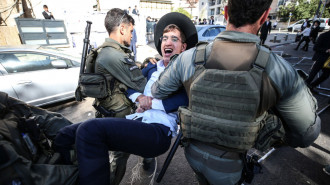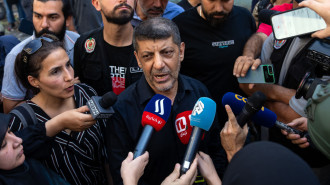Israel 'seeking to remain' in strategic Philadelphi corridor between Gaza, Egypt
Israel is seeking to remain in a strategic buffer zone between Egypt and the Gaza Strip after claiming on Wednesday to have operational control.
The buffer zone, known as the Philadelphi, or Salah Al-Din corridor, runs along Egypt's Sinai Peninsula on one side and the Palestinian city of Rafah in southern Gaza on the other.
An Israeli army spokesperson announced on Wednesday that the country's forces had complete control over the corridor, saying soldiers were operating in a "complex environment" along the border with Egypt and the military was paying a "heavy price".
The spokesperson said Hamas used the Philadelphi corridor to smuggle weapons, The New Arab's Arabic sister service Al-Araby Al-Jadeed reported.
A senior Egyptian source said there was "no truth" to "Israeli media reports of the existence of tunnels on the Egyptian border with Gaza", according to the Al-Qahera News broadcaster.
Israel's official Army Radio said that Israeli forces had gained control of the whole Salah Al-Din corridor "except a small part near the coast and the Tel Al-Sultan area".
The broadcaster added that the remaining segment was managed with firepower and surveillance, amounting to "operational control" over the entire corridor.
Israel's Yedioth Ahronoth newspaper reported on Thursday that senior Israeli military officials had proposed forming a "Philadelphi regional brigade".
The officials believe just announcing the creation of the brigade would pressure Hamas and could be used as leverage to negotiate the return of Israeli hostages in Gaza.
They also think such a move encourage the Egyptians to "work more effectively", for example, by building an underground barrier and establishing a joint operations room with Israel to manage the area.
But Yedioth Ahronoth said "not everyone" in the Israeli military believes in the idea, though it is considered "less bad" than other suggestions and would reduce the risk to troops in the area.
The newspaper quoted unnamed senior army officials as saying that in any case, leaving the Salah Al-Din corridor would "pose a major strategic risk" and would "cost us dearly".
Israel began a military assault on Rafah earlier this month, with the International Court of Justice ordering it to "immediately halt" its offensive there last Friday. Israel has failed to comply with the legally binding decision.
At least 45 people were killed on Sunday after Israeli airstrikes set fire to tents where displaced Gazans were sheltering, burning men, women, and children alive.
Scores of people are still being killed in Israel's indiscriminate offensive on the Gaza Strip every day, with the death toll standing at 36,224 as of Thursday.







 Follow the Middle East's top stories in English at The New Arab on Google News
Follow the Middle East's top stories in English at The New Arab on Google News


